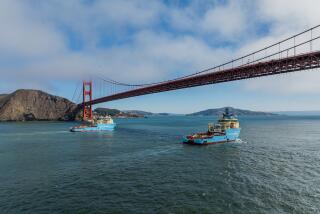Exxon to Resume Alaska Cleanup in the Spring, Coordinator Says
ANCHORAGE, Alaska — Exxon crews will return to Alaska beaches May 1 to clean up remnants of the nation’s worst oil spill, the federal coordinator for the cleanup said.
The announcement by Coast Guard Rear Adm. Dave Ciancaglini came Tuesday night after a meeting of 70 oil spill officials in Anchorage.
Otto Harrison, Exxon’s general manager for the cleanup, said winter storms alone will not be sufficient to scour some heavily oiled areas that remain in Prince William Sound.
Some Exxon officials had predicted that wind and wave action would make cleaning unnecessary this summer, and the company never committed itself to coming back. Harrison would not say directly that Exxon would return to work, but did say that additional cleanup work is necessary and the company will do whatever the Coast Guard orders.
Nearly 11 million gallons of oil spilled into the sound last March when the tanker Exxon Valdez ran aground. Hundreds of miles of pristine shoreline were blackened in the accident.
Oil spill officials from the state and federal government and Exxon spoke with unusual agreement at the meeting on the general outlines of next summer’s work.
Exxon’s Hans Jahns presented a report by the groups involved that said most of the oiled shorelines should be left to clean themselves, but that specific spots of heavy oil may need to be tilled, washed or dug up.
The work this summer will be unlike last year’s work of spraying the surface, said Steve Provant, the state’s on-scene coordinator. He said the state is asking that some sheltered beaches be dug up so the material can be washed and replaced.
Although such methods could destroy the life on the beach, it would be worth it to prevent animals from being poisoned by long-term exposure to oil, he said.
Ciancaglini will decide which cleanup techniques to use on each beach, based on what he hopes will be consensus recommendations from Exxon and government agencies, he said. They will form nine teams to visit beaches and decide what to do on each.
More to Read
Sign up for Essential California
The most important California stories and recommendations in your inbox every morning.
You may occasionally receive promotional content from the Los Angeles Times.










